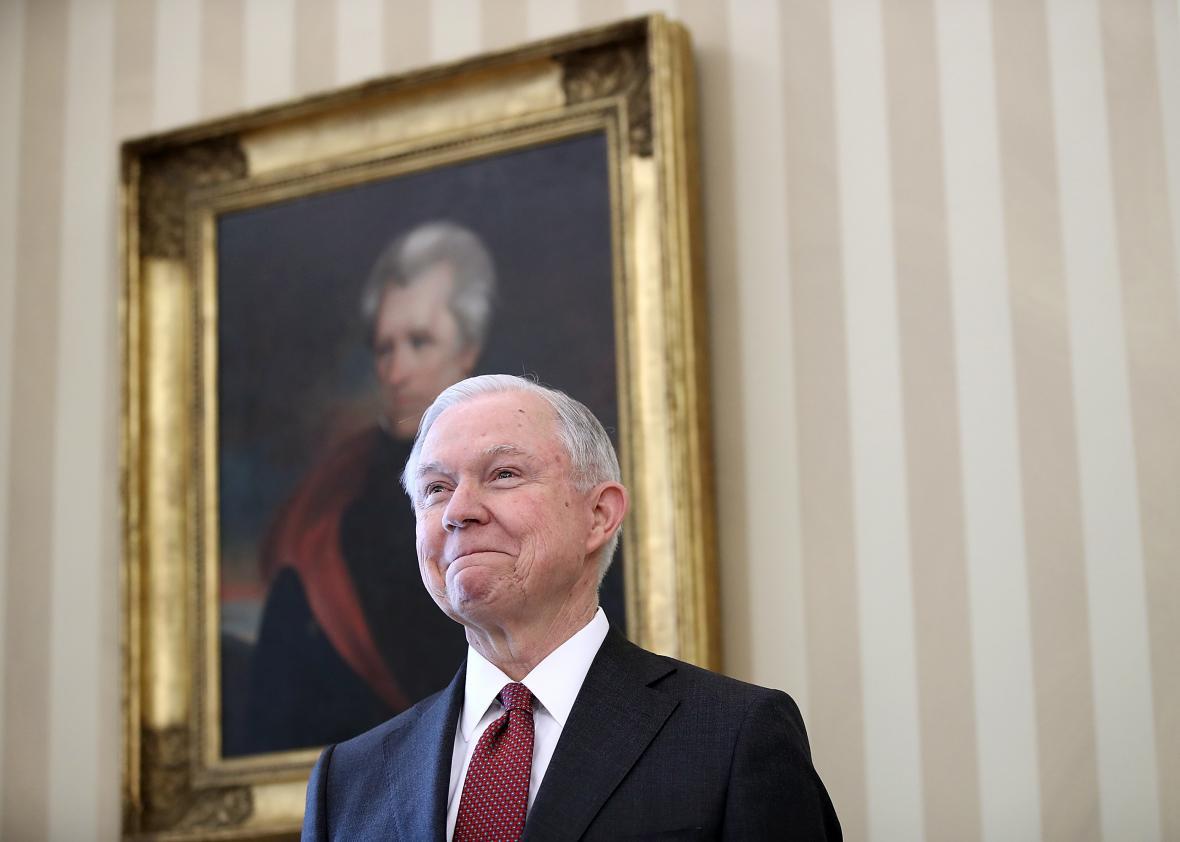
Win McNamee/Getty Images
The Washington Post is reporting that Attorney General Jeff Sessions had two conversations with the Russian ambassador to the United States during the runup to the 2016 election, when Sessions was a U.S. senator and a prominent Trump campaign surrogate. During his confirmation process this January, Sessions twice denied having any such contact.
In the confirmation hearing, Sen. Al Franken asked Sessions, “If there is any evidence that anyone affiliated with the Trump campaign communicated with the Russian government in the course of this campaign, what will you do?” Although Franken didn’t make a direct query about Sessions’s own communications, the then-senator took the opportunity to say he hadn’t chatted up any Russians, no siree.
According to the Post, Sen. Patrick Leahy also sent Sessions this written question in January:
Several of the president-elect’s nominees or senior advisers have Russian ties. Have you been in contact with anyone connected to any part of the Russian government about the 2016 election, either before or after election day?
Sessions’s reply: “No.”
It’s possible that one-word answer isn’t a fib—the Post and the Wall Street Journal, which also reported on Sessions’ contact with the Russian ambassador, don’t have any information about what he talked about with Sergey Kislyak. But if the newspapers’ reporting is accurate—and Sessions’ spokeswoman has confirmed that he did meet with Kislyak twice—then his response to Franken feels … perjury-ish.
Franken wrote on Facebook that Sessions’ answer to his Russia question now seems “at best, misleading.” House Democratic leader Nancy Pelosi straight up called Sessions a liar, writing that he “is not fit to serve as the top law enforcement officer of our country and must resign.” But the White House, predictably, is backing up the attorney general, calling this a partisan attack pushed by Democrats who are insanely jealous of the awesomeness of Trump’s Tuesday night address.
The attorney general’s spokeswoman, too, says Sessions is the victim here. She told the Post “there was absolutely nothing misleading about his answer,” because Sessions “was asked during the hearing about communications between Russia and the Trump campaign—not about meetings he took as a senator and a member of the Armed Services Committee.”
That is not a very convincing denial. Franken asked about communications between the Russian government and “anyone affiliated with the Trump campaign,” and Sessions acknowledged in his response that he was affiliated with the Trump campaign.
But reasonable people can differ on such things, I suppose. So, how should we decide whether this is perjury or an innocent omission?
Freshman Alabama Sen. Jeff Sessions had some thoughts on that very question during the Bill Clinton impeachment imbroglio, when the president stood accused of lying to a federal grand jury about his assignations with Monica Lewinsky.
“I sort of assumed perjury occurred, but I want to read what was said, what the established fact is, and decide how clear that is and whether or not there is any wriggle room or realistic defense there,” Sessions said in 1998. Back then, the senator described perjury as a “big-time issue,” adding, “I have no doubt that perjury qualifies under the Constitution as a high crime. It goes to the heart of the judicial system.”
Sessions ultimately joined 44 of his Republican colleagues in voting to convict President Clinton of perjury. His hard-line view on lying public officials did not win out. The perjury charge and a separate obstruction of justice charge (one Sessions also voted for) both failed to get the two-thirds majority needed to remove the president from office.
After failing to remove Clinton from office for lying under oath, Sessions told the Associated Press in February 1999 that he feared Clinton’s acquittal would “send the wrong message to a future generation of American leaders.”
When President Nixon resigned in the face of impeachment in 1974, he said, the message was clear that officials “couldn’t play games with the law and the truth.”
“I hope we haven’t sent a message that’s not as clear,” he said, “that clever people can sometimes get ahead by spinning and not telling the truth. That worries me.”
That worries a lot of us, Jeff.